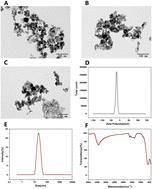当前位置:
X-MOL 学术
›
Environ. Sci.: Nano
›
论文详情
Our official English website, www.x-mol.net, welcomes your
feedback! (Note: you will need to create a separate account there.)
Enhancing maize stress tolerance with nickel ferrite nanoparticles: a sustainable approach to combat abiotic stresses
Environmental Science: Nano ( IF 5.8 ) Pub Date : 2024-10-16 , DOI: 10.1039/d4en00603h Yuying Tang, Yanru Ding, Muhammed Nadeem, Yuanbo Li, Weichen Zhao, Zhiling Guo, Peng Zhang, Yukui Rui
Environmental Science: Nano ( IF 5.8 ) Pub Date : 2024-10-16 , DOI: 10.1039/d4en00603h Yuying Tang, Yanru Ding, Muhammed Nadeem, Yuanbo Li, Weichen Zhao, Zhiling Guo, Peng Zhang, Yukui Rui

|
The use of nanotechnology to pre-treat crop seeds through seed treatments for enhancing their resistance to abiotic stresses is a promising and sustainable approach. This study demonstrates for the first time the potential of nickel ferrite (NiFe2O4) nanoparticles (NPs) in improving the tolerance of maize (Zea mays L.) exposed to drought and salt stress conditions. This study fills the current gap in understanding whether metal ferrite nanoparticles can mitigate abiotic stresses in crops, especially under hydric and saline stress. In this study, NiFe2O4 NPs were used as seed pretreatments to enhance the resistance of maize (Zea mays L.) experiencing drought and salt stress. We conducted a 7 day germination experiment and a 3-week seedling growth experiment to assess the impact of NiFe2O4 NPs on key growth parameters such as seed germination, seedling vigor, root and shoot length, and biomass accumulation. The findings indicated that under drought conditions, 40 mg L−1 NiFe2O4 NPs was the most effective concentration, leading to a substantial increase in the germination rate by 90%. Under salt stress, 20 mg L−1 was the optimal concentration, which resulted in a significant increase in seedling vigor by 521%, shoot length by 177%, and so on. In addition, NiFe2O4 NPs exhibited peroxidase (POD)-like activity, which could increase the antioxidant capacity of maize seedlings, thereby enhancing their stress tolerance. These results offer a theoretical foundation for the use of NiFe2O4 NPs in agricultural practices and highlight their unique potential for promoting plant resistance and sustainable agricultural practices. Although these results are promising, extensive research is needed to comprehensively elucidate the mechanisms through which NiFe2O4 NPs enhance stress tolerance. Future research should explore the prolonged effects of NiFe2O4 NPs on the growth of plants and yield, their potential environmental impacts, and their broader applicability. In addition, there is still a need to explore the interplay between NiFe2O4 NPs and other biotic or abiotic factors to optimize their application in agricultural systems.
中文翻译:

用镍铁氧体纳米颗粒提高玉米抗逆性:对抗非生物胁迫的可持续方法
使用纳米技术通过种子处理对作物种子进行预处理,以增强其对非生物胁迫的抵抗力,这是一种有前途且可持续的方法。这项研究首次证明了镍铁氧体 (NiFe2O4) 纳米颗粒 (NPs) 在提高玉米 (Zea mays L.) 对干旱和盐胁迫条件下的耐受性的潜力。这项研究填补了目前了解金属铁氧体纳米颗粒是否可以减轻作物的非生物胁迫的空白,尤其是在湿水和盐胁迫下。在这项研究中,NiFe2O4 NPs 被用作种子预处理,以增强玉米 (Zea mays L.) 对干旱和盐胁迫的抵抗力。我们进行了 7 天的发芽实验和为期 3 周的幼苗生长实验,以评估 NiFe2O4 NPs 对种子发芽、幼苗活力、根和芽长以及生物量积累等关键生长参数的影响。结果表明,在干旱条件下,40 mg L-1 NiFe2O4 NPs 是最有效的浓度,导致发芽率显着提高 90%。在盐胁迫下,20 mg L−1 是最佳浓度,这导致幼苗活力显着增加 521%,芽长显着增加 177%,依此类推。此外,NiFe2O4 NPs 表现出过氧化物酶 (POD) 样活性,可以提高玉米幼苗的抗氧化能力,从而提高其抗逆性。 这些结果为在农业实践中使用 NiFe2O4 NPs 提供了理论基础,并突出了它们在促进植物抗性和可持续农业实践方面的独特潜力。尽管这些结果很有希望,但需要广泛的研究来全面阐明 NiFe2O4 NPs 增强抗逆性的机制。未来的研究应探索 NiFe2O4 NPs 对植物生长和产量的长期影响、它们的潜在环境影响以及它们更广泛的适用性。此外,仍需要探索 NiFe2O4 NPs 与其他生物或非生物因子之间的相互作用,以优化它们在农业系统中的应用。
更新日期:2024-10-18
中文翻译:

用镍铁氧体纳米颗粒提高玉米抗逆性:对抗非生物胁迫的可持续方法
使用纳米技术通过种子处理对作物种子进行预处理,以增强其对非生物胁迫的抵抗力,这是一种有前途且可持续的方法。这项研究首次证明了镍铁氧体 (NiFe2O4) 纳米颗粒 (NPs) 在提高玉米 (Zea mays L.) 对干旱和盐胁迫条件下的耐受性的潜力。这项研究填补了目前了解金属铁氧体纳米颗粒是否可以减轻作物的非生物胁迫的空白,尤其是在湿水和盐胁迫下。在这项研究中,NiFe2O4 NPs 被用作种子预处理,以增强玉米 (Zea mays L.) 对干旱和盐胁迫的抵抗力。我们进行了 7 天的发芽实验和为期 3 周的幼苗生长实验,以评估 NiFe2O4 NPs 对种子发芽、幼苗活力、根和芽长以及生物量积累等关键生长参数的影响。结果表明,在干旱条件下,40 mg L-1 NiFe2O4 NPs 是最有效的浓度,导致发芽率显着提高 90%。在盐胁迫下,20 mg L−1 是最佳浓度,这导致幼苗活力显着增加 521%,芽长显着增加 177%,依此类推。此外,NiFe2O4 NPs 表现出过氧化物酶 (POD) 样活性,可以提高玉米幼苗的抗氧化能力,从而提高其抗逆性。 这些结果为在农业实践中使用 NiFe2O4 NPs 提供了理论基础,并突出了它们在促进植物抗性和可持续农业实践方面的独特潜力。尽管这些结果很有希望,但需要广泛的研究来全面阐明 NiFe2O4 NPs 增强抗逆性的机制。未来的研究应探索 NiFe2O4 NPs 对植物生长和产量的长期影响、它们的潜在环境影响以及它们更广泛的适用性。此外,仍需要探索 NiFe2O4 NPs 与其他生物或非生物因子之间的相互作用,以优化它们在农业系统中的应用。




















































 京公网安备 11010802027423号
京公网安备 11010802027423号